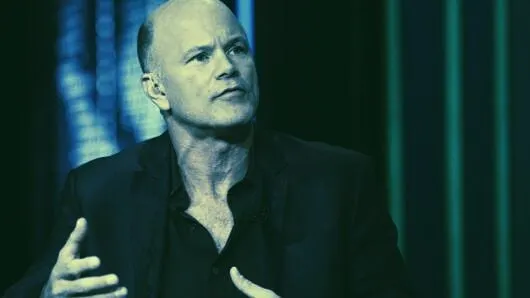In brief
- ConsenSys founder Joseph Lubin said the coronavirus crisis is an positive inflection point for blockchain technology.
- Blockchain technology, Lubin said, is ready for primetime in some cases.
- Mike Novogratz suggested the infrastructure isn't quite ready…but needs to be ready for a fast-changing world.
With Bitcoin just over a decade into its existence and Ethereum not yet five years old, it may seem improbable that anyone would look to blockchain as a replacement for our current economic systems. But the economic crisis spawned by COVID-19 seems to be what cryptocurrency was invented to address.
Did it come too soon?
In a "fireside chat" (read: video conference) with ConsenSys founder and CEO Joseph Lubin and Galaxy Digital founder and CEO Mike Novogratz at today's Ethereal Summit, moderator Angie Lau of Forkast.news wasted little time in asking whether the coronavirus-charged global political, social, and economic meltdown represents an inflection point for cryptocurrency's growth.
"Back at the first Ethereal…I was hoping central bankers could kick the can down the road another five or 10 years and enable us to build more," said Lubin. "And I'm not sure we're going to have that luxury anymore with COVID and the [global economic] crisis."
Lubin and Novogratz have made careers out of promoting Ethereum and Bitcoin, respectively. So, it's probably not a surprise to say that, overall, they were both optimistic about blockchain's long-term prospects. In the near term however, it’s more complicated.
Bitcoin as digital gold is a finished product
"Bitcoin's kind of a finished product if it's digital gold," Novogratz said. "We've also got to be cognizant that the rest of the space...It's not ready, next month, it's not ready next year...we're 2, 3, 4, 5, 6 years away from the real transformation."
In their wide-ranging chat, they revealed that it's all about timing. If you take the soufflé out of the oven too early, it collapses. But Lubin is definitely watching the oven.
He reasoned that the legacy economy—the one that currently exists—may chug along as something of a zombie for a while, perhaps giving the Web 3.0 builders additional time to create a foundation for a decentralized world.
It's something technologists need to prepare for, Novogratz suggested. "Stuff happens that you can't believe from before—like oil trading at minus $40…Nobody thinks the dollar is really going to lose its reserve status. It could. And it could—faster than we think."
We're not there yet
Novogratz sees crypto as, at minimum, a hedge against traditional monetary systems that are flailing. But in terms of the infrastructure necessary to replace the current systems? "We're not there yet."
On that point, Lubin saw it both ways. "I wanted a lot more time to build, to mature the technology, and I'm not sure we have a lot more time. I think we have to get busy now. Fortunately, we've been busy for a number of years, and it is ready for primetime. But it's not primetime everywhere, and it really depends on who you are."
Ironically, it should be pointed out, decentralization killed primetime. Whether it will kill the traditional banking system is anyone’s guess.


